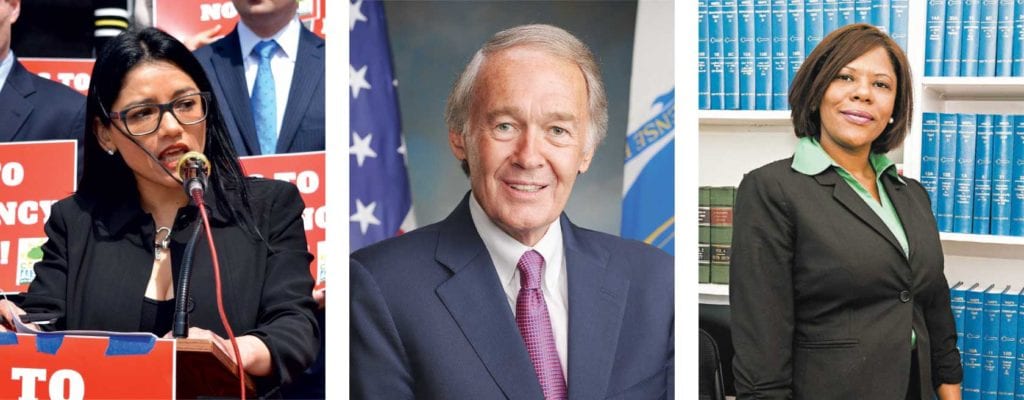
Carlos Escobar-Mejia, a 57-year-old man who had been living in the United States for 40 years, died on May 6 of COVID-19 while being detained in an immigration facility in San Diego. Escobar-Mejia’s passing marked the first confirmed coronavirus-related death in an ICE detention center.
Sen. Ed Markey joined immigration activists on Friday in an online conversation to discuss COVID-19’s impacts on the immigrant community.
“This is a time of great challenge for our country,” said Markey. “The coronavirus has helped to lift up the rock so that we can see all of the injustice that exists.”
As of Friday, at least 788 people detained by ICE have contracted COVID-19. According to May 8 statistics, the total detained population is 29,675, but only 1,593 detainees have been tested. Nearly 50% of those who received a test were positive for COVID-19.
Research suggests that infection rates for detainees will skyrocket.
“A new statistical model released last week predicted that within three months, the infection rate in the nation’s immigration detention facilities, including right here in Massachusetts, will reach 70-99% of the detained population,” said Fatema Sumar, vice president of Global Programs at Oxfam, in last week’s conversation.
Markey advocated for the release of immigrants currently detained by ICE.
“We have to release these immigrants from detention so that we provide the protection for them and anyone else that would come into contact with them,” he said.
The Federal Immigration Release for Safety and Security Together, or the FIRST Act, would mandate this release. The bill would also halt immigration enforcement against individuals not deemed a safety risk. Markey said he would “absolutely” consider co-sponsoring and supporting the bill.
“It is imperative that we move legislation to protect those people who would otherwise be exposed to this disease unnecessarily,” he said.
Senators Cory Booker, D-N.J., and Pramila Jayapal, D-Wash., unveiled the FIRST Act on April 13. Booker said that detention centers are like a “ticking time bomb.”
“They are severely at risk for a COVID-19 outbreak, considering the close quarters in which detainees are housed and a population with much higher rates of underlying health issues,” Booker said in a press release, adding, “This is really a matter of life and death.”
Deporting immigrants only worsens problems in their country of origin, noted Markey. He said that he was the first senator to call for a halting of deportations during the pandemic, nearly two months ago. Undocumented individuals should be treated as “part of our healthcare family,” he said.
Ivan Espinoza-Madrigal, executive director for Lawyers for Civil Rights, said that there have been alarming headlines covering the deportation of COVID-19 infected immigrants.
“This is highly concerning because it indicates that immigration facilities are not doing enough to test, treat, prevent and protect,” he said.
Natalicia Tracy, executive director for the Brazilian Worker Center, said that the COVID-19 pandemic has revealed the great inequalities that exist nationwide. The Coronavirus Aid, Relief, and Economic Security (CARES) Act, sponsored by Sen. Mitch McConnell, R-Ky. and passed in late March, provided certain low-income individuals with a $1,200 recovery check. Tracy questioned why the CARES Act hasn’t worked out better to include all taxpayers.
Markey said that the federal government should assist undocumented immigrants along with tax-paying individuals.
“Any undocumented [person] should be able to get the cash assistance,” he said. “I think that we should be helping people right now to survive. It’s dangerous not to help people survive.”
Markey recognized the number of essential workers that are undocumented. He said that these individuals need access to health care and “cash in their hands.”
Also of concern are the more than 300,000 U.S. residents under temporary protected status (TPS). Foreign-born individuals are eligible for TPS if they are unable to return safely to their country of origin. The majority of TPS residents are from El Salvador, Honduras, Haiti, Nepal, Nicaragua and Sudan.
Some TPS residents have been in the United States for decades but remain unsure whether the protection will remain. The government has extended the TPS end date, but it is currently set to expire for most TPS-holders on Jan. 4, 2021.
Markey is an original co-sponsor of the Safe Environment from Countries Under Repression and in Emergency (SECURE) Act, which would allow TPS recipients to apply for permanent residency. Markey said that TPS residents are “essential to America” and should not be deported.
“Now is the time for us to give them the protections which they deserve,” he said. “It would be absolutely below common decency to not now provide them with the protection for their families that they need, as they’ve been providing the protection for our families.”
“We need bold, transformational change in our country,” said Markey, and added that “We need to dismantle the deportation army of Donald Trump,” including dramatically increasing acceptance of asylum seekers and refugees and decriminalizing unlawful entry into the country.
Patricia Montes, executive director of Centro Presente, said, “We do not want to go back to normal after COVID.” The United States’ “normal” has systematically violated human rights, she said.
“The immigration system in the U.S. has historically been an exclusive and racist system that has treated the entire immigrant community, especially immigrants of color, as a threat to national security,” Montes said.
Tracy of the Brazilian Worker Center agreed.
“We can’t go back to business as usual,” she said, “because business as usual means that our community will continue to be marginalized, exploited and criminalized.”






